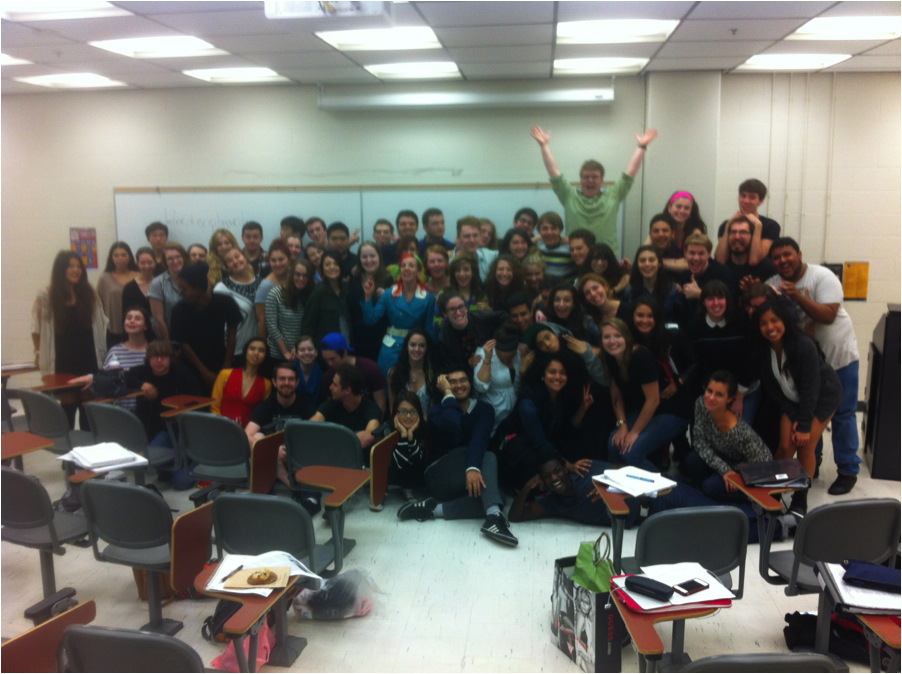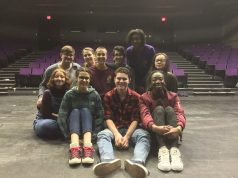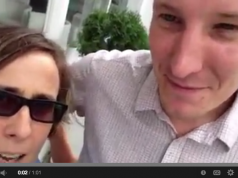
When Sarah Stanley asked me in August about having a class I teach at the Ryerson Theatre School guest-tweet for a feed about Canadian theatre history, I was shocked. People rarely, if ever, think of a history course as the first place to experiment with anything. I jumped at the opportunity, as I hoped it was a way to make the practice of history making come to life for the students. Because let’s get real- it’s usually pretty deadly. Henry Bial’s fabulous essay “Theatre Historian as Rock Star” does good to talk about the status of theatre history in the academy. Writing in 2007, he suggests:
History is over, rather, in the way that grunge rock, independent bookstores, and Late Night with David Letterman are. History is ‘so last century.’ Most of our students see neither the need for nor the appeal of history. They begrudgingly accept a semester or two as the cost of admission to more immediately amusing or lucrative pursuits. They regard the fact that we scholars continue to practice it anyway as a function of faith, inertia, and indescribable geekiness. You might have noticed that theatre, too, has this problem. Twice damned, then, the theatre historian: the most abject apostle of an already abject faith. (Bial 81)
My blood pressure got higher upon reading; I realized that I was actually thrice damned: I was to be the INSTRUCTOR of that “abject” pursuit- charged to teach this practice to acting and production students in a bachelor of FINE arts program that has a practical focus. How do you get these kinds of students to buy in?
Sarah’s invitation to guest tweet seemed the perfect opportunity to get the course alive again: to directly connect the work we were doing in class to the conversations taking place in the digital world quite active around us. I was also excited because I thought this tweeting idea might serve to clarify the course’s major and most sophisticated concept (one that I had struggled to make clear to students in years past): the relationship between theatrical creation and history making. Could a simple tweet let them comprehend the complex concept of historiography?
With this question in mind, an assignment structure became clear. Thanks to Sarah’s support and input, I developed what we now call the course’s “tweeter” assignment. Here’s how it works: each week in the course, ten students are required to find an important event in Canadian theatre history that occurred on any of the same Monday-Thursday dates of the class week. Drawing on that research, they develop a tweet. I edit and post what I think are the best tweets of the week. Generally, I was content just knowing that this project would have them searching through historical newspaper databases. From my perspective, if all else failed, that was enough of a reason for the assignment.
So, that’s why I said yes. But the concern became execution. What made this assignment most difficult to develop were my own confines: I’m that geeky theatre historian that Bial talks about! What did I know about tweeting? Not a whole lot. I freaked, and then, like a real nerd, sought comfort in a Canadian theatre history timeline: Ric Knowles’ “Just the High Points: A Canadian Theatre Chronology.” My first lecture traditionally talks about Ric’s first entry on his timeline (a description of “pre-contact” performance) in order to open up a broader discussion about the politics of “beginnings.” Knowles usefully describes one event in his first timeline entry as the “so-called” Kwakiutl Mystery Cycle. Through his use of a small phrase (“so called”), Knowles opens up a whole conversation on HOW the history of pre-contact performance had been, to that date, described. It suddenly occurred to me Knowles was doing tweetable historiography!
So we used him to start. Have we reached Knowles’ level of concise and critical brevity in our own course tweets? No so far. But hey, at least we’ve been re-tweeted! TWICE! Overall, we are inspired by him to resist merely assembling of a number of FACTS about Canadian theatre history for #CdnTheatreThrowback. As I learn more about Twitter, I also realize that implicit in its very functionalities are lessons about history making. Where Knowles cannot live link to the other scholars who CALLED the Mystery Cycle just that, twitter allows for linking that can enable a viewer to encounter the source immediately. Students who have linked to articles show an observation of the discrepancy between sources—the ways in which one event, when told in a different light, can have a totally new meaning.
Twitter’s other useful functionality for the purposes of our course is mentioning. This ensures that we all try to maintain connections between the historical material we are tweeting about and current companies or individuals to whom those moments pertain. Finally, twitter’s enforced brevity teaches students about the barbarism of history. While selecting an event to tweet is difficult enough, by far the greatest limitation with twitter, especially for the academic context, is its demand for concision. Students grapple with containing so much analysis in a very small character count. That is where the understanding of the violence of creativity (and history as another creative practice) is, I think, best comprehended. We could teach Bogart in directing class, but I think it has a place in history class too.
Of course, we have only just started, and so I am excited to see what aspects of twitter’s functions we have not yet mined. Questions of accreditation still worry me. Though I am currently the de-facto editor of our tweets @THF403, overall I think it’s important for students to see themselves as authours of their contributions, to take ownership of how their ideas are received by an audience that is the twitter community. We’ve got a long way to go, but we’re excited about the journey. Many thanks to Sarah and Michael for getting us involved! We’ll see you at #CDNPerformPast soon, and in the meantime you can follow us @THF403.
Some Sources You Might Be Interested In:
Bial, Henry. “The Theatre Historian as Rock Star, or Six Axioms for a New
Theatre History Text.” Theatre Topics 17.1 (2007): 81-86. Project MUSE. Web. 8 Sep. 2013. <http://muse.jhu.edu/>.
Knowles, Ric. “Just the High Points? A Canadian Theatre Chronology.” In Theatre
Memoirs: On the Occasion of the Canadian Theatre Conference, 1998. Toronto: PUC, 1998. 74-89.









